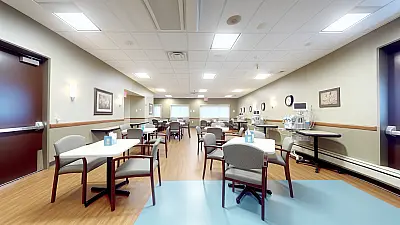WACO, TX - State health inspectors issued an immediate jeopardy citation to Lake Shore Village Healthcare Center after discovering critical failures in monitoring and responding to residents' nutritional decline, including one resident who left the facility with unaddressed dietary issues.

Critical Nutritional Monitoring Failures Identified
During a complaint investigation on May 10, 2025, inspectors uncovered systemic breakdowns in the facility's nutritional care processes that placed residents at serious risk. The most concerning finding involved Resident #1, whose nutritional status deteriorated without proper intervention before leaving the facility under circumstances that remain unclear from the inspection report.
The investigation revealed that six additional residents were consuming 25% or less of their meals - a dangerously low intake level that requires immediate medical attention. These residents had not received timely evaluations or physician notifications as required by federal regulations. The facility's audit, conducted only after inspectors arrived, found these residents had been experiencing "low or declining intake" without appropriate clinical interventions.
According to the inspection findings, nursing staff failed to notify physicians when residents refused meals for two consecutive days or consumed less than 25% of their food. This represents a fundamental breakdown in basic nutritional monitoring protocols that facilities must maintain to prevent malnutrition and dehydration.
Medical Implications of Inadequate Nutritional Monitoring
When elderly residents consume only 25% of their meals, they face rapid deterioration in multiple body systems. Protein-energy malnutrition develops quickly in older adults, leading to muscle wasting, immune system compromise, and increased fall risk. The body begins breaking down its own muscle tissue for energy within 24-48 hours of inadequate intake, accelerating functional decline.
Dehydration compounds these risks, as many elderly residents obtain significant fluid intake through their meals. When meal consumption drops to 25%, fluid intake typically falls proportionally, potentially triggering acute kidney injury, urinary tract infections, and confusion. In nursing home populations, even mild dehydration increases mortality risk by 30-40% according to established medical literature.
The facility's failure to implement immediate interventions when intake dropped below critical thresholds violated established clinical protocols. Standard practice requires physician notification within 24 hours when a resident's intake falls below 50%, with urgent notification for intake below 25%.
Systemic Communication Breakdowns
The inspection revealed multiple layers of communication failure between certified nursing assistants (CNAs), licensed nurses, and medical providers. CNAs who directly observe meal consumption were not properly trained to recognize and report concerning intake patterns. The facility acknowledged that staff required "re-education" on documenting meal percentages and notifying charge nurses of poor intake.
Licensed nursing staff similarly failed in their responsibility to escalate nutritional concerns to nurse practitioners and physicians. The inspection report noted that nurses needed "immediate" re-education on notifying practitioners within 24 hours of identifying nutritional changes - a basic nursing responsibility that should not require remedial training in a properly functioning facility.
The facility's morning meetings, where department heads should review residents with poor intake using their clinical dashboard, were apparently not identifying at-risk residents. Only after the inspection began did the Director of Nursing conduct a "full audit" that identified the six residents with critically low intake.
Additional Issues Identified
Beyond the primary nutritional monitoring failures, inspectors documented several related deficiencies:
- Absence of updated care plans reflecting residents' nutritional status changes - Inadequate competency validation for staff on meal percentage documentation - Missing administrative oversight of the facility's meal management system - Lack of quality assurance processes to identify residents with undetected weight loss - Failure to recognize "significant changes" requiring regulatory notifications
Industry Standards and Required Protocols
Federal regulations mandate that nursing homes maintain each resident's highest practicable physical, mental, and psychosocial well-being. This includes preventing malnutrition and dehydration through systematic monitoring and early intervention. Facilities must implement graduated interventions when residents show declining intake, including dietary consultations, meal supplements, assistance with eating, and medical evaluations.
Best practices require daily intake monitoring with automatic triggers for intervention when consumption falls below 75% for two days or 50% for one day. The facility's threshold of waiting until intake dropped to 25% falls far below acceptable standards and places residents at immediate risk of serious harm.
The facility's corrective action plan includes daily monitoring of residents with poor intake for 30 days, followed by weekly monitoring for an additional month. All nursing staff will receive mandatory in-services on meal percentage documentation and notification protocols before beginning their shifts. The quality assurance committee will review these issues monthly to prevent recurrence.
Full Inspection Report
The details above represent a summary of key findings. View the complete inspection report for Lake Shore Village Healthcare Center from 2025-05-10 including all violations, facility responses, and corrective action plans.
💬 Join the Discussion
Comments are moderated. Please keep discussions respectful and relevant to nursing home care quality.